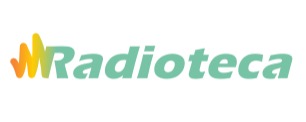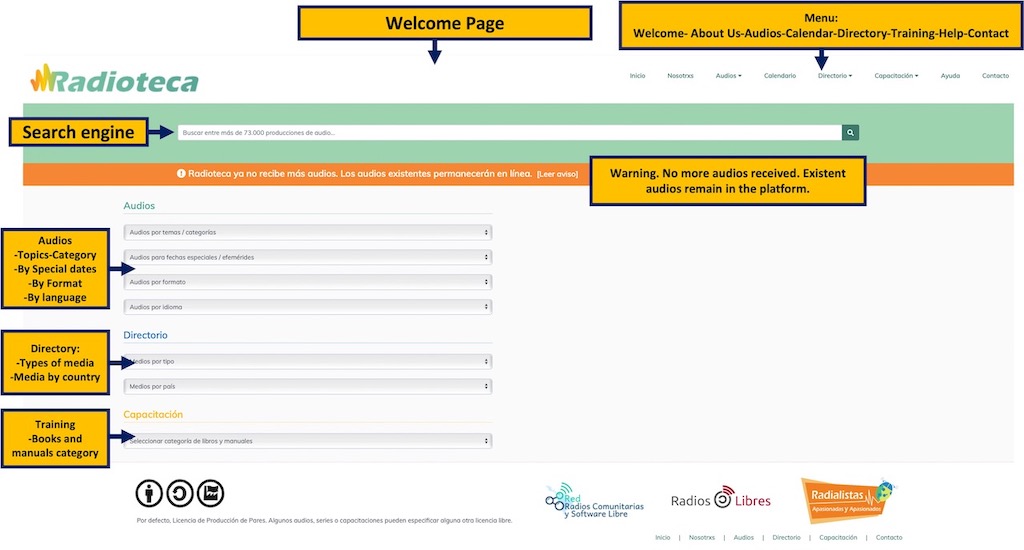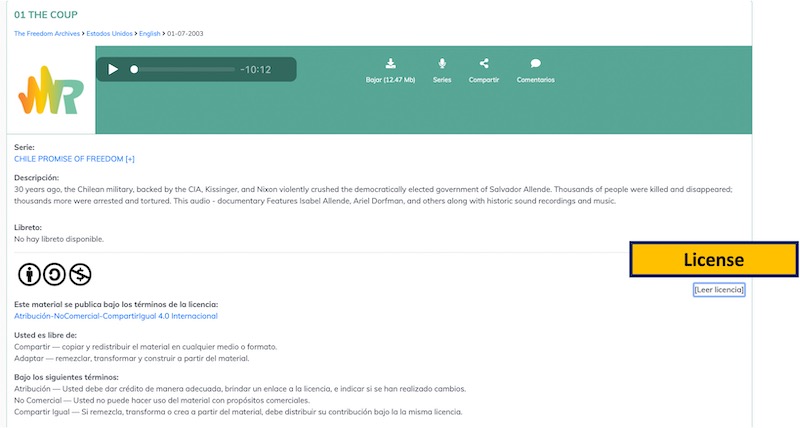Radioteca
From CIRCA
| VTracker |
|---|
| Content deleted. (7 Occurances) |
| Content stucture deleted. (2 Occurances) |
| Content inserted. (118 Occurances) |
| Content structure inserted. (184 Occurances) |
| Content structure deleted. (1 Occurances) |
| Content changed. (3 Occurances) |
| Content moved. (8 Occurances) |
| Content NEED DESCRIPTION. (2 Occurances) |
| Content NEED DESCRIPTION. (2 Occurances) |
| Content of a table reordered. (1 Occurances) |
Contents |
ABOUT
The idea of Radioteca started in June 2004, at the II ???Foro Social de las Americas??? (Social Forum of the Americas). Some of the topics addressed in this event are: human rights, peace, poverty, hunger, corruption, democracy, indigenous people rights, social initiative 1. In this forum, a group of radio producers met at CIESPAL -Centro International de Estudios Superiores de Comunicacion para America Latina (International Center for Higher Communication Studies for Latin America). One of the projects proposed during this event was a digital platform where people could share audios. In 2005, UNESCO held a reunion in Guadalajara to talk about successful communication experiences in Latin America and Caribbean. Was until 2006, that Radioteca was launched, being UNESCO a great contributor to the project.
 Retrived from: https://radioteca.net
Retrived from: https://radioteca.net
PURPOSE
Radioteca is a digital platform designed to share and exchange radio productions in order to enrich each other. It is build by hundreds of stations, centers, networks, of Latin America and the world. All the audios are license ???free??? , meaning that it's possible to download, transmit and remix (following certain conditions, such as maintaining the author or who paid the publicity).
*
INTERFACE
 Retrived from: https://radioteca.net
Retrived from: https://radioteca.net
Radioteca has a
Welcome page that includes:
Menu:
- *
- *
- *
- *
- *
- About Us
- Audios
- Calendar
- Directory
- Training
- Help
- Contact
Research engine:helps to find audio in the library (which includes
more than 73,000 audios)
Audios catalog, classified by:
- Topics-Category
- By Special dates
- By Format
- By language
A directory classified by:
- Types of media
- Media by country
Training
- Books and manuals category
LANGUAGES
The interface is in Spanish, but there's a variety of audios in the following languages:
- Castilian
- Quechua
- Aymara
- Guarani
- Maya K'iche
- Wayuunaiki
- Mazateco
- Mixteco
- Qeqchi
- Qanjobal
- Chorti
- Peqomchi
- Kriol
- Tzotzil
- Tzeltal
- Kichwa
- Shuar
- Waorani
- Wichi
- Toba
- Nahuatl
- Miskito
- English
- French
- Galician
- Hebrew
- Portuguese
- Italian
- Yucateca
- Mam
- Kaqchikel
AUDIENCE
Very wide audience, since it contains a great variety of contents.
Mainly for Latin American and Caribean people, given theprevalence of languages.
INTELLECTUAL PROPERTY
All audios in Radioteca , indicate the name of the author. (Gago, 2013, p. 255)
Although this platform is based in "shared rights", meaning that it's possible to download, copy and broadcast the audios that are available in Radioteca , each audio has a specific license and its own terms and conditions of use. In order to enter to the license and conditions of use of each audio, the user should click on the audio, then click on the "Comments" Icon and then click on "Read license". As shown below:
 Retrived from: https://radioteca.net
Retrived from: https://radioteca.net
It is stated in Radioteca that all audios should respect "the credits" (the final line that recognizes the author of the audio), they should never be deleted or modified.
TECHNOLOGY
- Download audios to transmit them in your station Downloading audios from the platform (for free).
- Doesn???t require any special software to download the audio.
- Users can listen to audios directly from Radioteca in their personal web page or blog. (Gago, 2013, p. 237)
- Before 2020 it was possible to upload and save audios in Radioteca.
- Streaming was possible at a very low cost (Gago, 2013, p. 252) (not available anymore).
CONDITIONS TO UPLOAD AN AUDIO
- It's banned to upload "partisan political publicity or religious proselytism " (Gago, 2013, p. 256).
- Contents should respect "human rights, cultural diversity and culture of peace "(Gago, 2013, p. 256).
- Contents should "transcend the journalistic situation and very local areas so that they can be used anywhere and at any time" (Gago, 2013, p. 256).
- Audios should be "clear and be in the following format: mp3, 128 Kbps/44.1 Hz ". (Gago, 2013, p. 256)
COLLABORATION
- Collaborative work.
- Team in Chile and Ecuador update the webpage: Num??rica Latina RedRadialistas.net
FUNDING
- Theres no exact data of the origin of the funds for Radioteca, though it mentions some organizations that supported the initiative, such as:
Radialistas Apasionadas y ApasionadosUNESCO en QuitoCAFODHIVOSDW-AkademieCodigo SurRoberto SotoRed de Radios Comunitarias y Software LibreGuifi.net
DEFUNDING
- Theres no exact data of why the project in 2020 ran out of funds.
- Now a Days it's no longer possible to upload audios.
- u In 2020 the platform ran out of funds. u Now a Days it's no longer possible to upload audios.u There are still available more than 73,000 to listen and downloadThere are still available more than 73,000 to listen and download
REFERENCES
[1]1 Tiempo, E. (2004, 06 29). El Tiempo. Retrieved from https://www.eltiempo.com/archivo/documento/MAM-1514113
[2] Gago, S. G. (2013). Manual Para Radialistas Analfatecnicos.La Paz: Ministerio de Communicacion del Estado Plurinacional deBolivia.
RadiotecaRadioteca. (n.d.). Retrieved 10 2021, from https://radioteca.net/staticpage/quienes-somos
